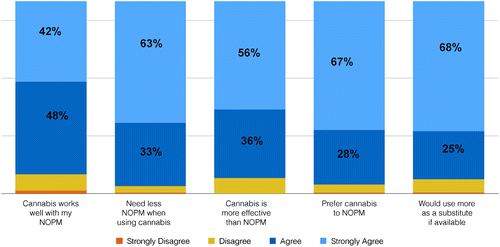Pain patients who used both opioids and cannabis, 92% overwhelmingly prefer the latter

Survey completed through HelloMD:
Table 1. Sample Demographics
N (%)
Male 1593 (55)
20–29 898 (31)
30–39 666 (23)
40–49 406 (14)
50–59 406 (14)
60+ 435 (15)
White (not Hispanic) 1854 (64)
Hispanic/Latino(a) 406 (14)
African American 203 (7)
Asian 145 (5)
Pacific Islander 29 (1)
American Indian 58 (2)
Other ethnicity 203 (7)
High school 435 (15)
Some college 1130 (39)
College graduate 927 (32)
Graduate school 406 (14)


Supporting the results of previous research, this study can conclude that medical cannabis patients report successfully using cannabis along with or as a substitute for opioid-based pain medication. Echoing the results of Ware et al. and Abrams et al., patients in this study who are using cannabis and opioids report that they are able to use less opioids and that cannabis presents less unwanted side effects than their opioid-based medication.9,11 In addition, 80% of patients reported that cannabis by itself was more effective than their opioids. It is possible that the variability of individual endocannabinoid and endo-opioid systems results in varying levels of efficacy between the two treatments. For example, a recent review released by the National Academy of Sciences reports conclusive evidence cannabis' efficacy in treating chronic pain, but localized versus neuropathic pain might demand different approaches.17 Cannabis has been found to be very useful in treating neuropathic pain specifically.11
This study found a similar pattern of results when looking at substituting cannabis for nonopioid-based pain medication like Tylenol and Advil. Research suggests that long-term use of these remedies might lead to organ damage.18 With cannabis not only becoming more accepted in the mainstream but also coming in a variety of preparations, some of which are nonintoxicating, more people are looking at cannabis as a viable treatment for everyday ailments such as muscle soreness and inflammation. The results of this study support that not only is this practice common but also medical cannabis patients who choose to use cannabis as a substitute for these medicines report better outcomes with fewer unwanted side effects with cannabis compared to their other medications.
Participants in this study overwhelmingly supported the notion that they would be more likely to use cannabis as a substitute for pain medication if it were less stigmatized and more available, suggesting that there are populations of people who could benefit from this practice but are shying away due to the stigma and legal restrictions related to cannabis use. If cannabis laws continue to change across the country, it will be important to assess how changes in these laws might impact other public health behaviors and outcomes, such as opioid overdose, dependence, risky behaviors, and spending on prescription medications.
Interesting article :)